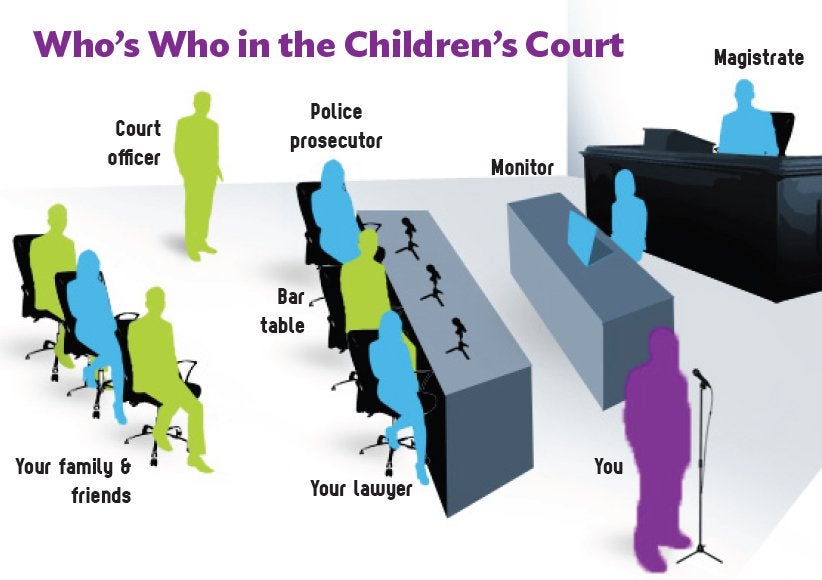Legal aid is automatically given to young people appearing in the Children's Court who have been charged with a criminal offence or where an Apprehended Violence Order is being taken out against them. This means that young people do not have to pay any money for a lawyer from Legal Aid NSW to represent them.
Most children’s courts have a Children’s Court Assistance Scheme where you can find help to fill out the legal aid application form.
If you have been charged with a traffic offence, you may need to go to a local court instead of a children's court and you are not automatically entitled to be represented by a legal aid lawyer. You can ask a legal aid or duty lawyer more about this when you get to court.
You can also get advice on the Legal Aid NSW Youth Hotline. Call 1800 10 18 10.
At Parramatta, Surry Hills, Campbelltown, Woy Woy, Wyong, Broadmeadow and Port Kembla Children's Court, a Children's Legal Service lawyer from Legal Aid NSW will be there to see you. The Children's Legal Service also appear on children's court list days at Nowra, Goulburn, Raymond Terrace, Cessnock, East Maitland and Singleton courts.
At other courts Legal Aid NSW pays for private lawyers or ‘duty lawyers’ to look after you. Aboriginal Legal Service lawyers are also available in many children’s courts to represent Aboriginal and Torres Strait Islander young people.
Lawyers will start seeing people around 9am and will generally see people in the order that they arrive. It is better to turn up early but sometimes people who come after you may be seen and have their matters dealt with first.
There is a good reason for this, so don’t get frustrated. If there is a particular reason why you need your matter dealt with early, like a job interview or a medical appointment, you should let your lawyer know.
Your lawyer is there to explain your case and what happens in court, listen to your side of the story, give you advice, answer your questions and represent you in court. Most things you tell your lawyer are confidential. That means they can’t tell anyone else what you’ve said – even your family or carers – unless they get your permission. There are some exceptions to this, like if you tell your lawyer you are going to hurt someone when you leave court.
Your lawyer will give you advice about your options at court but you get the final say about what you want to do.
The police need to prove their case against you and you have a right to silence – you don’t have to say anything to the police if you don’t want to.
Anything you say to the police or anyone else (except a lawyer) may be used as proof against you, so it is important to speak to a lawyer before you talk about your case to anyone else.
You have to turn up for court when your court attendance notice tells you to. Sometimes the court will issue a warrant for your arrest if you don't turn up. Or the court may find you guilty of the crime you have been charged with without you being there. If you can't get to court because you are sick, you should call the court and tell them. They may ask you to provide proof, like a medical certificate, which you should ask your doctor to fax to the court.
If you know that you won't be able to come to court, for example if you are in rehab or have an important exam, you should contact the court as soon as possible. If you have been to court for that matter before, you should also contact your lawyer and tell them why you can't come to court on that day.
Having a case go through the court is sometimes a long process and it can be frustrating for you, the court and even your lawyer! There are normally good reasons why your matter can't be finished as quickly as you would like.
Your matter might get adjourned (put off until another date) a few times if:
- you plead not guilty
- your lawyer is asking the police to change the charges or the facts
- you plead guilty and Youth Justice NSW is preparing a background report or your lawyer is getting a report from a youth worker, counsellor or doctor.
Just remember that no one wants you to come to court more times than you have to.

Where can I get more help?
| Organisation | Information | Contact details |
|---|---|---|
| Legal Aid Youth Hotline | The hotline provides legal advice and information to young people under 18. It operates 9am to midnight weekdays, with a 24-hour service from Friday 9am to Sunday midnight and also on public holidays. | Phone: 1800 10 18 10 |
| Law Access NSW | Provides free telephone legal information and referrals to other services, including to your nearest Legal Aid NSW office, Community Legal Centres, private lawyers and other organisations that can help. | Chat to our team by clicking on 'Chat with us' on the right or by calling 1300 888 529 Mon to Fri 9am - 5pm. |
October 2023